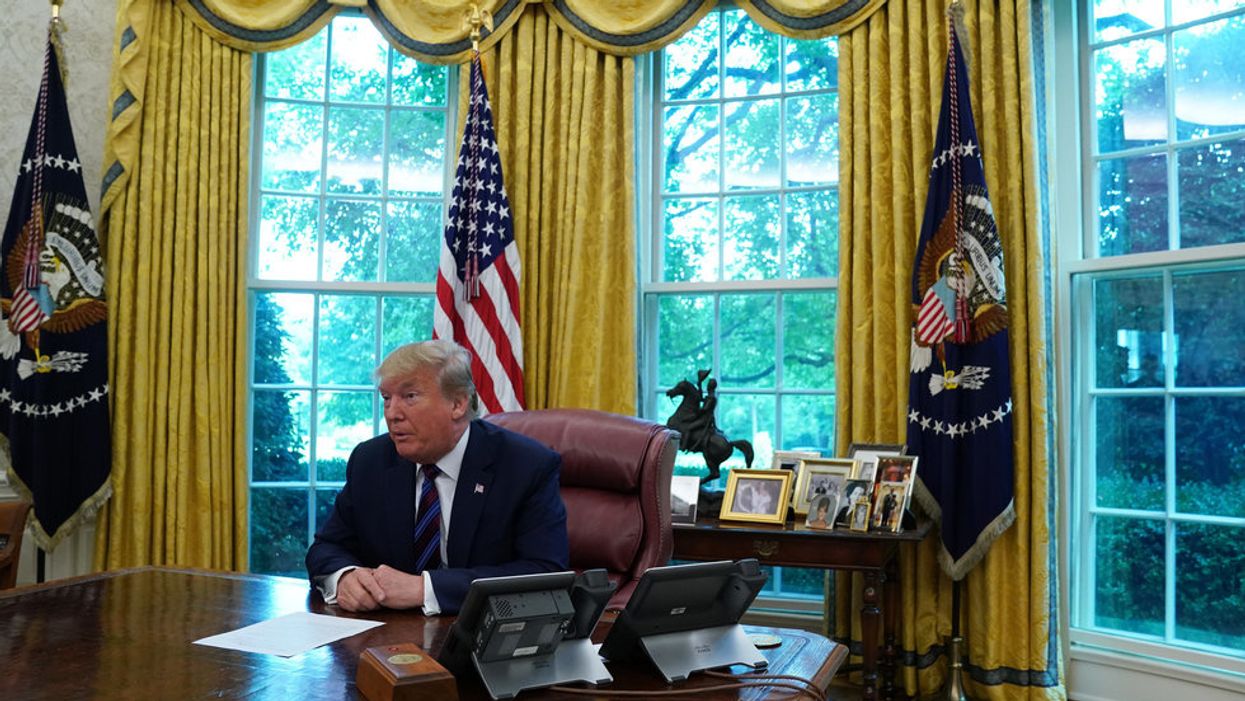Nyman is a government affairs specialist and Marcum is a governance fellow at the R Street Institute, a nonpartisan and pro-free-market public policy research organization.
Update: President Trump was impeached by the House of Representatives on Dec. 18.
Imagine the following: Early next year the House of Representatives impeaches President Trump. One of these three scenarios is likely to follow.
Behind curtain number one, the president is acquitted at the subsequent trial in the Senate. He then takes the stage in Charlotte, N.C., to accept the Republican nomination for president in 2020.
Behind curtain number two, the Senate convicts the president and he is removed from office — yet he still takes the stage in Charlotte to accept the 2020 nomination.
Behind curtain number three, the president, having been impeached by the House, resigns from office. Nonetheless, he still makes his way to Charlotte to accept the 2020 nomination.
Each scenario is both possible and constitutional. Worse still, they are nationally unprecedented and each has the potential to severely damage our political institutions.
Because Richard Nixon resigned in 1974 before an impeachment vote by the full House, we have only two presidential impeachments to draw on for our analysis: those of Andrew Johnson and Bill Clinton. As in these cases, an impeachment vote is the most likely outcome. A simple majority in the House suffices to impeach a sitting president. Today, Democrats hold a majority of the seats. More than 220 of them already support taking action on impeachment.
Once a president is impeached he faces the possibility of removal from office. Removal of a sitting president entails a higher burden than does impeachment: It requires a trial before the Senate, presided over by the chief justice of the United States. A two-thirds majority is required for conviction on each count brought by the House. Being found guilty on any single charge means Trump's removal from office. According to current rules and Senate Majority Leader Mitch McConnell's own words, the Senate would be compelled to hold a trial. Yet given the Republican majority in the Senate, it is likely that — just as in past instances — the vote fails to reach that supermajority threshold.
If that happens, the Constitution permits a second Senate sanction: "disqualification to hold and enjoy any office of honor, trust or profit under the United States." In other words, a vote for disqualification would forbid the president from running for federal office ever again.
And yet, barring a Senate vote in favor of this sanction, the president's removal from his current office is not tied to disqualification from holding future federal office. As Ohio State law professor Edward Foley observes, "The Senate's practice in impeachment cases has been to hold separate votes on removal and disqualification." Indeed, in our nation's history, there have been only eight successful impeachment convictions, and of those, only three of the individuals impeached were prohibited from holding future office.
In other words, though the likelihood of Trump being removed from office is slim, unless the Senate subsequently votes to disqualify him from holding future office he could run for president again in 2020. This would be an unparalleled event in American history and open the door to many uncomfortable situations.
The president's unprecedented post-impeachment campaign would face off against an unprecedented challenger. Polling indicates the likely Democratic nominee will either be a senator who could cast a vote to remove Trump from office or the individual whose family was central to the Ukraine machinations that sparked the initial impeachment inquiry. In fact, eight of the potential Democratic nominees are sitting members of Congress who would be involved in the impeachment or removal process — a scenario that seems more appropriate as a chapter out of Hobbes' "Leviathan" than legitimate political procedure.
Yet it could very well happen. After all, Trump's quiet retirement is unlikely, and the president has shown an eagerness to reinstate a full political campaign. Both the political and legal realities support his fervor.
The political groundwork for Trump's 2020 campaign, too, has already been laid. Even if he were to lose the support of voters, the Republican National Committee would have no time to present a viable contender before the primary season, which begins in four short months.
Another discouraging note: If Trump is impeached, it will mean two out of the last four American presidents have been sanctioned in this manner — both in the last 21 years. Before Nixon and Watergate in the 1970s, 11 decades elapsed between presidential impeachment attempts. It is not as though more than six scores of American history were devoid of scandal — the Grant Whiskey Ring and Teapot Dome representing just the tip of the abuse-of-executive-power iceberg.
As the partisan divide deepens and impeachment proceedings intensify, the courts may very well need to adjudicate new or unforeseen constitutional questions. On these issues, if the Supreme Court is thrown into the fray, it risks dangerously tying the judiciary to the politics of impeachment and increasing the public's growing cynicism toward the third branch.
For Trump, impeachment is likely, removal is dubious, and a re-election campaign is all but certain. This domino effect of unprecedented circumstances poses uncomfortable questions that challenge our democratic norms and could fatally weaken our longstanding institutions.



















Why does the Trump family always get a pass?